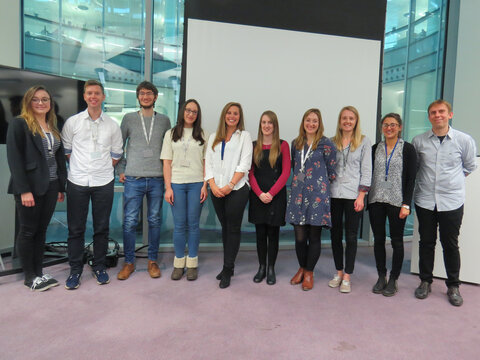Culicoides-borne Virus Interest Group

On 14 June The Pirbright Institute held a series of early-career scientist talks, organised by the Culicoides-borne Virus Interest Group.
"Today we had a series of excellent talks from early-career students and staff from the Entomology, Orbivirus research and Non-Vesicular Research Lab Groups at Pirbright. The talks covered myriad aspects of vector-borne disease science, including vector activity and behaviour, pathogenicity in mammalian hosts, outbreak modelling, vector competence and diagnostics, highlighting a diversity of exciting research in Culicoides and mosquito-borne virus systems", Dr Christopher Sanders (Senior Postdoctoral Researcher, The Pirbright Institute).
Overwintering of Culicoides - Jess Stokes
Co-ordinating capacity and understanding parameters determining transmission of economically important arboviruses in the UK.
Investigating the effects of Culicoides saliva on phagocytosis in bovine monocytes - Amelia Powell
Investigating the effects of Culicoides saliva on phagocytosis in bovine monocytes by Amelia Powell.
African Horse Sickness Virus: a comparison of pathogenicity - Luke Jones
African Horse Sickness Virus: a comparison of pathogenicity between strains in an IFNAR-/- mouse model
Investigating the mating success of homologous and reciprocal crosses of the Culex pipiens biotypes - Laura Jones
Investigating the mating success of homologous and reciprocal crosses of the Culex pipiens biotypes
Investigating the role of animal housing in the overwintering of adult Culicoides - Laura Tugwell
Investigating the role of animal housing in the overwintering of adult Culicoides
Elucidating the role of T lymphocytes in pathogenesis during bluetongue virus infection in sheep - Kerry Newbrook
Elucidating the role of T lymphocytes in pathogenesis during bluetongue virus infection in sheep.
Building capacity for research on sandflies, biting midges and blackflies at the Gnatwork - Emma Howson
The Gnatwork aims to create a network of scientists around the world working across blackflies, sandflies and biting midges. To enhance links between researchers, the Gnatwork has funded two competitive calls to support collaborative small-scale projects, which link to countries receiving Official Development Assistance. From this, five projects have been funded. We have recently opened a third call, the Gnatwork Community Call, in which the community has voted for the projects that they want to see funding; you can now apply to carry out one of these projects. Overall, by creating a network of researchers, we aim to make significant progress in transferring techniques across all three vector groups, developing new ones and building a more resilient research base for these vector groups.
Development of an xMAP based assay for the serotyping of bluetongue virus - Martin Ashby
Development of an xMAP based assay for the serotyping of bluetongue virusDevelopment of an xMAP based assay for the serotyping of bluetongue virus.